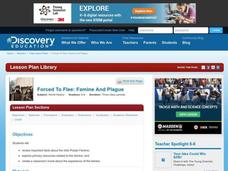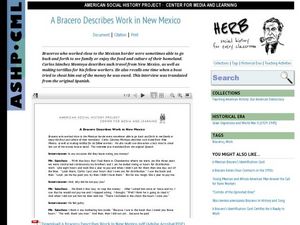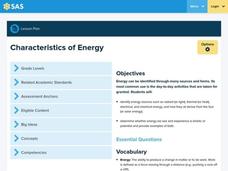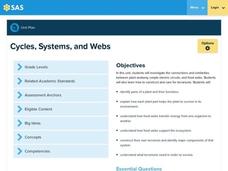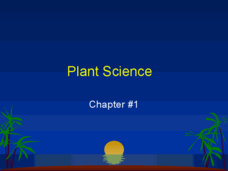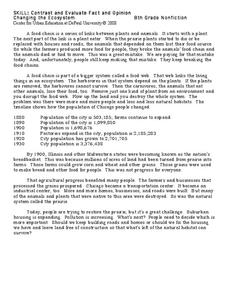Curated OER
Forced to Flee: Famine and Plague
Students examine facts about the Irish Potato Famine and explore primary resources, such as newspaper articles, photographs, songs, and poems, related to the famine. Once research is complete, they create a small collage of their...
Curated OER
Greenewables
Learners form expert engineering teams working for the (fictional) alternative energy consulting firm, Greenewables, Inc. Each team specializes in a form of renewable energy used to generate electrical power: passive solar, solar...
Curated OER
A Bug's Life
In this biology worksheet, learners create a presentation for a museum about the children they encounter during their journey as an insect. They identify the types of food the insect eats and its habitat. Students also describe their...
Curated OER
Model of a Well
Students complete an experiment using wire screening, wires, water, sand, and food coloring to compare the relationship of groundwater to wells. In this water lesson plan, students observe and record what they see after they complete the...
Curated OER
Education, Design & Empowerment: Part One
Learners consider the connection between poverty and education. In this language arts and social studies lesson plan, students research primary and secondary sources in order to explore the relationship between education and poverty.
Curated OER
A Bracero Describes Work in New Mexico
In this primary source analysis activity, students analyze an interview with a bracero whose boss tried to take his money. Students respond to 3 short answer questions based on the interview.
Curated OER
President Hoover Encourages Private Charity
In this primary source analysis worksheet, students analyze a letter from Herbert Hoover to a little girl collecting donations to help those in need during the Great Depression. Students respond to 7 short answer questions about the letter.
Curated OER
Characteristics of Energy
Fourth graders view a video and create a KWL to identify energy sources. In this energy sources lesson, 4th graders explore the meaning of energy, kinetic energy, potential energy, thermal energy, radiant energy, and electrical energy....
Pennsylvania Department of Education
Cycles, Systems, and Webs
Fourth graders review the parts of the plant and their functions. In this plant lesson plan, 4th graders recognize that plants must transfer energy to make food. Students understand the interdependence of organisms in an ecosystem.
Curated OER
How is Atomic Energy Used Today
Students investigate energy sources by examining photographs. In this atomic energy lesson, students identify and describe various pictures and how atomic energy is used in them. Students create a presentation demonstrating how many...
Curated OER
Chemical Formulas
Here is an interesting lesson which invites learners to focus on understanding and interpreting the symbols used in writing and communicating information about chemical elements, compounds, and equations. The hope is that this knowledge...
Curated OER
The Web of Life
Students explore the interconnectedness of living things in an ecosystem. They use pictures and arrows to develop a food web, and participate in constructing a class food web with students representing various parts of the web.
Curated OER
Plant Science Chapter #1
It may not stand as a cohesive presentation, but individually you may find a use for these slides. One slide describes how civilization began once man learned to plant and harvest food. Another explores the population growth over time....
Curated OER
Food Systems Feed the World
Sixth graders consider the source of their nutrition. In this food systems lesson plan, 6th graders discuss how food gets to the table and the process it goes through. Students reflect on world hunger issues, farming, and consumerism...
Roy Rosenzweig Center for History and New Media
American Indians and their Environment
People could take a page in ingenuity and survival from the Powhatans. Deer skins became clothes, and the members of the Native American group farmed the rich Virginia soil and hunted in its forests for food. Using images of artifacts...
Choose My Plate
MyPlate Crossword Puzzle
Reinforce food group facts with a crossword puzzle that highlights healthy nutrition and cooking habits as presented by the MyPlate eating recommendations.
Shelby County Schools
How Ecosystems Work
How does one organism get its energy? What is the main source of energy in an ecosystem? How does the flow of energy affect different types of ecosystems? Answer these questions with a fill-in-the-blank worksheet.
DePaul University
Contrast and Evaluate Fact and Opinion
How can you tell when an author is expression an opinion or stating a fact? Use two short reading selections to emphasize the difference between a statement that you can prove and one that you can't. The first passage explains food...
New South Wales Department of Education
The Mangroves
Mangroves are a nursery for a variety salt-water organisms. Learners explore the mangrove ecosystem through audio, video, and/or images, to see the organisms that live in this environment and make food chains pertaining to this...
Science Matters
Peanut Energy
How do humans get energy since they aren't mechanical and can't photosynthesize? Learners explore this question by relating potential energy in food to human energy levels. Scholars measure the change in mass and a change in temperature...
Montana State University
Everest Extremes: Biodiversity
How many animals can live in a climate as cold as Mount Everest's? Find out with a science instructional activity all about biodiversity. Activities include research, presentations, group work, coloring maps, and a simulation of a food web.
National Park Service
Fitting In
Birds help other birds find food? Scholars are placed into one of five groups of different birds. Each group then "feeds" on letters of paper in a field and gather five pieces per person. As each group plays, more food is exposed,...
Civil War Trust
Civil War Soldier: Experiencing the Battle of Franklin
Fighting a war over home soil makes a living nightmare even more real. Class members describe the experience of a Civil War soldier during the Battle of Franklin, poised right at a major turning point of the war, after researching the...
NOAA
Animals of the Fire Ice
When the sun's rays can't reach the producers in a food web, where does all the energy come from? Extreme environments call for extreme food sources. Young scientists investigate creatures that appear to get their energy from methane...
Other popular searches
- Food Sources
- Food Origins
- Aboriginal Food Sources
- Esl Food Sources
- Food Origins Of
- Science Sources of Food


